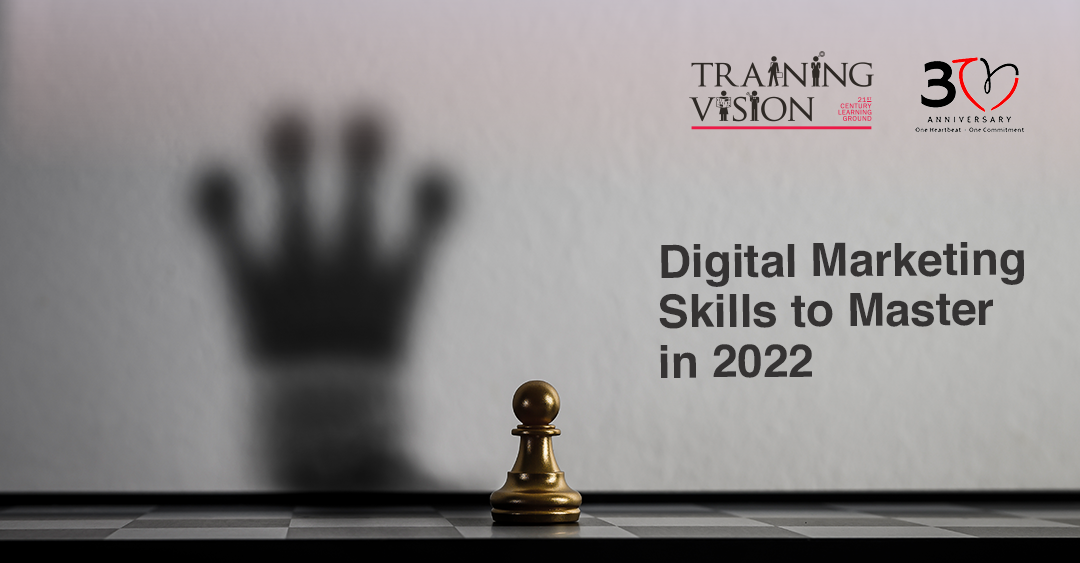The past ten years paved the way for major transformations and digital innovations, and this resulted in the birth of a new kind of marketing professional—data-driven and growth-minded digital marketers who take charge of increasing website traffic, hitting revenue targets, and expanding growth numbers. No wonder they are the most sought-after professionals by the best companies in any given field.
Although some digital marketers only have a skill or two, acquiring multiple digital marketing skills will allow you to be on top of your game. Remember that digital marketing is a rapidly evolving industry where trends are constantly changing, so it’s a great idea to develop and master these four digital marketing skills at the least:
- Content marketing
- SEO (Search Engine Optimisation)
- SMM (Social Media Marketing)
- Data Analytics
To get a better understanding of these skills, read on.
Content marketing
The ultimate goal of digital marketing is to grow your business and to achieve this, you must first attract paying customers. Content marketing is designed to do just that.
Some people automatically think of blogs, Facebook, Twitter, Tiktok, and YouTube when they hear the words “content marketing”. While it has some truth in it, content marketing has been around for as long as we can remember. This is because content marketing has always been about telling stories and all of us would listen to someone who has the greatest story to tell.
The Content Marketing Institute defined content marketing as a strategic marketing approach focused on creating and distributing valuable, relevant, and consistent content to attract and retain a clearly-defined audience—and, ultimately, to drive profitable customer action.
We must say that this is a solid definition, but let us focus on the words, valuable, relevant, and consistent. It says it requires consistency which makes it a long-term strategy, and the goal is to gain your audience’s trust in your brand and products and services. You work on this goal by providing content to your audience that is not only high-quality but also something that they find valuable and relevant to their everyday lives.
When your customers decide to spend their hard-earned money on purchasing your product, it means that you have already gained their trust. So your next goal is to keep them closer and nurture this relationship. Since you are providing them with useful content, they go back for more. It makes them feel that you are paying attention to their needs and that you are resonating well with their lifestyle.
Content comes in various forms and it appears in almost all places. The internet is an endless space, and you don’t know where your target audience hangs out most of the time. Are they usually on social media? Do they love reading long articles? Or are they more attracted to short-form videos? The thing is, wherever they may be spending most of their internet time, it is also important to know these things so that you know what form of storytelling will appeal the most to your audience.
Search engine optimisation
To put it in simple terms, SEO or search engine optimisation means enhancing your content or website to make it appear on the top part of Google search results. This is basically what you do with your blog post content so that your audience will see it. Now, for this digital marketing skill to be effective, you need to first understand how the Google algorithm works. No one knows how it works exactly—all we know is that there are three stages that your website or content has to go through before it reaches your audience.
First stage: Crawling. Google bots (also known as spiders) crawl the internet and look for new and updated web pages. If your content has a lot of links to it, the bots find it easier to locate. Thus, it is important that Google knows that your content is out there on the internet.
Second stage: Indexing. After Google discovers these new links and web pages, its next process is to analyse what are these pages about based on the content, images, videos, and other media files on the page. It will then store this information in a huge database called Google index.
Third stage: Serving. In this stage, the pages are ranked based on their relevance and helpfulness for a specific keyword search.
People search for things online for various reasons, but it all boils down to just two things—they want to know something, or they want to solve a problem. Google made it a mission to provide a great customer experience by giving them what they need exactly. So if you search for “cheap quality shoes near me”, it won’t just give you the best quality shoes, or the least expensive shoes you can find. It will give you the least expensive shoes of great quality and the store near you where you can buy them. Therefore, your content should do the same thing so that Google will show it first to its customers. This also makes your content writing skills put into practice. As Bill Gates said in 1996, content is king.
Social media marketing
The evolution of social media for the past decade is something that most of us have seen happen before our eyes. From being just a simple way to connect to our family and friends, it is now being used by businesses—SMEs and huge enterprises alike—to introduce their products and services to a wide variety of audiences. Thus, social media marketing is born.
Social media marketing is an essential aspect of your digital marketing strategy for a variety of important reasons. Here are some of them:
- It allows you to connect with your audience on a personal level. Consumers want this personal connection, which leads them to trust your brand which can positively affect their purchasing decisions.
- It humanises your business. Social media presence personifies your brand which sets the stage for an emotional connection with your audience. It allows people to see the human side of your business—how it converse if it were a person, how it looks like, its interests, why does it what it does, and so on.
- It increases your audience reach. The beauty of social media lies in the fact that people can share and repost your content. What’s more, they can even create content about your products and tag you in their posts. That gives way to a huge possibility for your brand to be seen by people outside your network.
- It enhances your online presence. Social media provides you with the exposure that you need to gain attention from your target audience. Remember that there are 3.78 billion social media users across the globe. That’s 3.78 billion chances of your content being viewed, your website visited, and products being sold.
- It appears to be the least expensive among all of the available digital marketing strategies available. For starters, you do not have the pay anything to create an account on each platform. There is a wide array of free tools that you can use to create content, schedule posts, shorten links, and even the reporting on your content.
Many organisations today are keen on hiring their own digital marketers for these reasons. Make it your reason to develop your social media marketing skills.
Data analytics
If you love math and numbers, there is also something for you to do in digital marketing—data analytics. Simply put, this is where you transform raw data into actionable insights. The digital transformation gave us the ability to collect data that may help us in our business, but we need someone who would interpret the data otherwise it is good for nothing. Skills in data analytics include the ability to identify patterns and pinpoint the information that mere observers would otherwise miss.
Here are some of the reasons why data analytics is important in digital marketing:
- Understand the behaviour of your target audience. You need to know what your target audience is like—their interests, the things they like, the stuff they need, and the type of content that they tend to avoid. This is where you start strategising your marketing efforts because you just need to provide them with the kind of content they want to consume.
- Find out which marketing initiatives are working and which are not. These numbers would actually let you know if your content marketing efforts are actually gaining web traffic or if you need to find another strategy that will work best. Are people interested in your social media posts? Are your social media content resonating with your audience that they like and share your posts? What needs to be improved? Are there strategies that you just have to forget and abandon completely? These things can be determined once you know how to interpret data.
- See how your competitors are doing it. Learning from your competitors is actually a good thing. Through analysing their data, you would find out what they are doing to get good numbers and favourable results.
- Check profitability. Again, the ultimate goal of digital marketing is to grow the business, and of course, you’d very much like to see if your marketing efforts are working towards the goal.
- Make a sound decision for the future. Your previous and current data can say a lot of things about the future of your business. By analysing the data in your hands, you can start making decisions and planning ahead.
It can be a challenge to keep up in a fast-changing industry like digital marketing. There is always something new to learn, and a wide array of opportunities offered. However, if you have a growth mindset, and you are the type of person that is keen to get the job done, then there is nothing to worry about staying on top of the game.
Enhance your digital marketing skills mentioned above (and more) by signing up for our Professional Diploma in Digital Marketing & Campaign Strategy. It provides highly-relevant digital marketing skillsets that are immediately transferable to the workplace.








